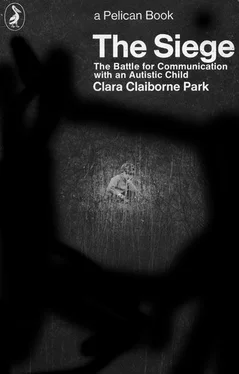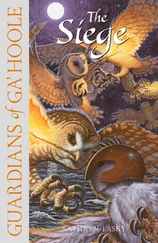Not that she had changed. She was as undemanding as ever. But parents’ expectations of a child approaching two grow more pressing. As she grew older, though we were relaxed about her talking, we expected her to understand the simple things we said to her. Yet we would ask, or forbid, offer a cookie, ask her to come or to go, and there would be no response. It was as if she had not heard us. Had it always been so?
It became increasingly difficult to leave her with baby-sitters; they expect a child nearing two to respond to simple commands. They expect a child nearing two to respond to a lot of things — a tone of voice, a smile, the sight or sound of children entering a room. Elly, contented on the floor, would not even look up.
We have photographs from this period too. One shows a plump blond baby looking into the camera with an expression that is curiously tense. Not at all the serenity I remember, certainly, but I also remember the struggle we had to go through to get those pictures. David took them as always, and the rest of us, the children and I, put our whole effort into attracting Elly’s attention and getting her to look at us. Such unusual, persistent goings-on — no wonder she looked worried. Another picture is relaxed enough — Elly limp as a rag doll in her sister’s arms, her lovely face looking beyond us into space. Another is quite a success — at first glance. Elly is smiling, even laughing. But she is laughing at no one. The picture shows a forest of arms — Sara’s, mine — two of us tickling her to achieve that gaiety which even in the pictures looks somehow frenetic.
Not that she never laughed spontaneously. She did, and if we could have caught it, it would have made as normal a picture as you please. But that laughter was indeed spontaneous — it welled up from nowhere, it related to no human situation. Nothing in our words or our expressions would generate it, save that wild tickling, the direct bodily invasion of her privacy. The children tried it a little, for the picture’s sake, and the laughter, and the closeness to the pretty baby sister. But they tried it less and less, and at last where they were not noticed rarely intervened. She did not bother them and she did not need them. On all fours, from room to room, from back yard to front, down the path, up the driveway, she followed her different drummer. I remember one sunny spring day, the yards filled with playing children, my neighbour and I standing and watching Elly as she crawled serenely away from us all. Something about her isolation — she was so tiny, and already so far away — made me say, only half joking, ‘There’s nothing the matter with Elly. She just has a distorted sense of what’s important.’ My neighbour laughed at the application of such inflated language to a baby. But it is I who have had the last laugh, if you could call it that.
What the doctor said was, ‘If you’re not worried, I am.’ I do not have the novelist’s ear for remembered dialogue, but some words I have not forgotten. Elly was twenty-two months old, and she was in a doctor’s office for the first time in nearly a year. Only once had a doctor seen her in the interim — for the ear-ache mentioned in the last chapter. Then, Elly had been cheerful and secure in her favourite place, her crib; he was not her regular doctor, and he had never seen her before. He had exclaimed, as recorded, that she was a lovely baby.
A house call is an unusual thing for us; we have had perhaps four in fifteen years. We are lax about doctors, having been lucky enough to be able to take health for granted. We were never ones to bother a doctor with monthly check-ups of patently healthy babies. Unlike most of our friends, we had no paediatrician. We didn’t think we needed one. I had no obstetrician for Elly; I didn’t think I needed one. The excellent general practitioner who delivered her, saw her three or four times in her first year, checked her progress, and gave her routine injections. She had a mild eczema at thirteen months; he cleared it up with the only shot of penicillin any of my children has ever had. It was time for her vaccination, but because of the eczema the doctor suggested we defer it. Characteristically, months had gone by before we got around to taking Elly back to him. Hard to believe as that seems now, we went to get her vaccinated, not to ask about her strangeness. I was expecting nothing eventful when I carried Elly into the office and set her on the examination table. The doctor asked if she was walking. I said no, but that I wasn’t worried. Becky and Matthew had both walked late, and besides, Elly was already beginning — she’d walk with me if I held her hands. I tried to show the doctor. Elly’s knees buckled and she relaxed into a crawl. ‘Does she talk?’ ‘A couple of words.’ Not suddenly, but slowly and mercifully, the realization began to take form. Any one symptom might be insignificant. Children differ. But add them up…
But we had not nearly reached that point, the doctor or I. It was merely that he thought she should be tested under hospital conditions. There were two obvious possibilities. One was phenylketonuria, a metabolic defect more common in blue-eyed, yellow-haired girls, causing retardation if not checked early but controllable with diet. The other was thyroid deficiency, which would explain not only the lack of speech — a slight retardation which could be caught and treated — but the delayed walking. The joint-structure is still immature from the deficiency perhaps… Curiously, the nascent anxiety relaxes. The doctor has seen only this limp and passive creature on his office floor. I, who remember Elly hanging from her father’s thumbs, supported only by her strong fingers, who watch her daily leaping and tumbling in her crib as on a trampoline, do not really expect to hear that there is anything the matter with Elly’s joints. And of course there is not. In three days of hospital tests they find no evidence of physical deficiency at all. Our doctor watched her, checked her hearing, called in the paediatrician, we hadn’t thought we needed. Together they agree that she is ‘still within the curve of normal development’. It is the paediatrician, who does not know our family, who remarks that ‘she seems like a child who has been raised very much alone’. Considering that she has spent her short life in a house pulsing with activity, the diagnosis is already implicit in that sentence. But neither we nor the doctors know that.
I was irrationally relieved to find the tests were negative. I had never had a child in the hospital. The doctor had advised against visiting Elly; it might upset her. That first night she had been away, I had, for the first time in years, no small child to put to bed. I sat down in the living room in unaccustomed leisure, but I could not read. I put on the Brahms Requiem — the music I had chosen the night of Elly’s birth to fill the time of the first slow labour pains. ‘Behold all flesh is as the grass and all the goodliness of men is as the flower of grass.’ I sat in the easy chair and listened and wept for my baby whose flesh was as a flower, who had begun her birth to this music and who might, it seemed, be something less than perfect. So much of pride had I invested in my bright and beautiful children and my great good luck. I could actually be glad when the doctors found no physical deficiency. It was as I had thought; my child was strong and well, she would walk when she was ready. Nothing was wrong with her bones or her brain. She would grow and take her place in a family lovelier than anybody else’s.
It is possible to learn humility. A year later, Elly would be examined again, in a bigger hospital with more refined techniques. And this time I would wait at night and hope and nearly pray that they would find a physical deficiency — something that could be controlled with a diet or a pill. And then my baby’s perfect health would be a heartbreak to me and no source of pride.
Читать дальше












